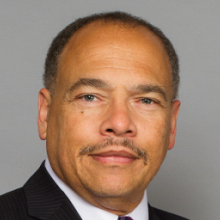 Charles W. Richardson Jr. is the new dean of the School of Business at Claflin University in Orangeburg, South Carolina. He was a visiting professor at William Paterson University in Wayne, New Jersey. Earlier in his academic career, Dr. Richardson was an associate professor of marketing at Clark Atlanta University.
Charles W. Richardson Jr. is the new dean of the School of Business at Claflin University in Orangeburg, South Carolina. He was a visiting professor at William Paterson University in Wayne, New Jersey. Earlier in his academic career, Dr. Richardson was an associate professor of marketing at Clark Atlanta University.
Dr. Richardson had a 25-year career at AT&T where he was manager of marketing information systems, manager of international communication systems, and manager of global business communication.
Henry N. Tisdale, president of Claflin University, said that Dr. Richardson’s “track record of leadership, corporate, and academic experience, tremendous personal energy, and strong commitment to achieving excellence will surely enhance our business programs on a global scale.”
Dr. Richardson is graduate of Pratt Institute in Brooklyn, New York, where he majored in mathematics. He holds a master’s degree in operations research and statistics from Rensselaer Polytechnic Institute in Troy, New York, an MBA from New York University, and a doctorate in marketing and international business from Pace University in New York.












I am curious in knowing if Dr. Richardson created an internship or employment pipeline for students from HBCUs during his 25 year career at AT&T. If no, I would definitely question his true commitment towards HBCUs. Further, I always find it quite amazing that in many instances you’ll see Blacks who worked in White corporate America pursuing the ‘almighty dollar’ along with being on the receiving end of disparate treatment. Then, after they have been intellectually exploited in various ways they finally decide to work at an HBCU as a last stop in their career. In my view, this is hypocrisy at the highest level. Let’s be clear, Dr. Richardson is not the only Black professional who followed a similar track.
Michael have you considered the corporate experience and networking that Dr. Richardson brings to the table? Where do you think these students will seek employment after graduation? There are way too many professors and administrators in academe that do not have a clue on what it is like to be inside corporate America. Why is it that we criticize another black who has achieved high position in the corporate world? Corporations do not promote blacks or anyone that does not produce proven results. Their profits are too important for tokenism anymore. My two sons are corporate executives and trust me, they earned it. I retired from the corporate world and I taught them plenty about upward mobility when they were growing up. I am an electrical engineer by training and I know plenty white colleges and universities that have hired retired corporate people to be president, dean, class room professors, etc. Matter of fact my alma mater hired a retired IBM Ph.D. Engineer to become their dean of engineering. This is when I was an engineer at IBM years ago. Based on your complaint, I am guessing that it is OK for predominantly white universities to hire corporate talent, but not a predominantly black schools. Hopefully, we can get pass this kind of thinking one day. I do not know Dr. Richardson, but I wish him the best in his new position.
Re: Dave;
It’s quite apparent you have misinterpreted my comments. What is quite obvious that my comments struck a chord in you personally based upon your emotive response. In fact, if you reread my comments, I never questioned Dr. Richardson professional experience or networking in any capacity. I merely posed a question that I’m always amazed in how we have instances when these so-called Black professionals trudging in “White corporate America” (a description you would probably never use) and then after being exploited and treated disparately. Then, all of sudden they have an epiphany and finally decided to venture to an HBCU.
Within the context of your commentary, you make a valiant attempt to make it as if you’re exceptional along with your sons pontificating “they earned it”. The realty is that Blacks (in the future, use a capital “B” instead of the lower case “b” and read the works of Dr. Claude Anderson to understand this point). I would suggest that learn how to differentiate between a “complaint” and asking a critical question. Finally, I would venture in saying that your neoliberal ideology has stunted your ability to think critically and merely support the “status quo”.